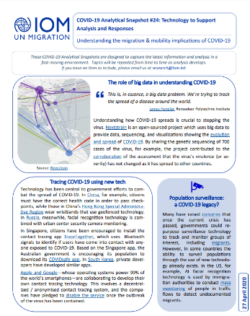Date: 19/03/2021
 Ben Brindle is an SCDTP-funded student in Economics. His PhD explores whether previous UK studies have failed to detect adverse wage or employment effects of immigration because the labour market adjusts by alternative means. Other research interests include environmental economics and development in emerging economies. Ben has worked as a research assistant for Jonathan Wadsworth at the LSE’s Centre for Economic Performance and is a UK Data Service Data Impact Fellow.
Ben Brindle is an SCDTP-funded student in Economics. His PhD explores whether previous UK studies have failed to detect adverse wage or employment effects of immigration because the labour market adjusts by alternative means. Other research interests include environmental economics and development in emerging economies. Ben has worked as a research assistant for Jonathan Wadsworth at the LSE’s Centre for Economic Performance and is a UK Data Service Data Impact Fellow.
Working for a migration NGO during a year of immobility
It’s an understatement to say I was shocked when I was offered an internship in Geneva with the Migration Research Division at the International Organization for Migration, the United Nation’s migration agency. Since I was a PhD researcher studying the labour market impact of immigration, I’d applied for the role on the off chance – the worst they could say was no. Yet here I was, preparing to set off for Switzerland and begin a six-month internship where I would be able to do my bit to support vulnerable migrants and mobile populations across the world.
Little did I know that migration and mobility – or a lack of it – would play such a large part of all of our lives over the next 12 months.
January and February were a rollercoaster. My time was predominantly spent updating the IOM Research Twitter feed, organising seminars with international migration experts and, most excitingly, conducting initial research for the 2022 iteration of the organisation’s flagship publication, the World Migration Report, which the research division releases every two years.
My task was to research regional developments which had the potential to impact migrants or migration for a chapter in the upcoming report, spanning anything from new laws and policies to conflict and disasters. It turns out that the world is a big place!
Then, in March, one of the developments I had written about for the East Asia region – the outbreak of a virus which had led to mobility restrictions in Wuhan and the Hubei provinces of China – impacted my life more than I had anticipated: as Switzerland locked down, I hastily returned to the UK before air travel stopped and the borders slammed shut.
While the pandemic brought about many negative changes to all of our lives, it made our work incredibly interesting. We began developing COVID-19 Analytical Snapshots, 1-2 page infosheets presenting the latest information and analysis of the migration and mobility issues related to the pandemic. I was able to write about a range of emerging topics, from the economic and development impacts of the pandemic to its effect on returning migrants, the creation of travel bubbles, and more.

Writing the snapshots was incredibly rewarding. As one of the first sources to emerge detailing how COVID-19 was impacting migration and mobility, the snapshots received plaudits from both governments and researchers. But it was also exhausting. While the rest of the country resorted to baking sourdough, I was working an extra hour or two a night to write as many as I could!
In July I was given a three-month extension and returned to Geneva, determined to make the most of my time. This wasn’t too difficult, as the Swiss had taken an incredibly relaxed approach to the pandemic which allowed me to see the country relatively freely. I felt extremely fortunate to have the opportunity to travel around a new country in 2020. Even when I visited the Alps and was met by cloud and torrential rain!

But our work didn’t let up just because mobility restrictions did, and during these summer months we worked with leading migration researchers from outside the organisation to produce a range of outputs.
On the pandemic front, we commissioned a number of migration experts to write short think pieces which detailed how COVID-19 had transformed an element of migration and mobility, and organised accompanying webinars where these experts could discuss their papers in detail.
We also looked beyond the pandemic and put out a call for papers around the theme of “under-researched and published geographies.” I spent much of my time reading through abstracts and making comments on draft papers, culminating with a paper exploring stigma and empowerment through the experiences of Nepalese women labour migrants. It was a nice change to be the one making comments on others’ research!
In October I was granted a further three-month contract extension and began working from the UK once more. But while much changed our work went full circle, as I started working on two thematic chapters for the World Migration Report: one about peace and security and another about the pandemic.
I was asked to write a number of case studies for these chapters, covering topics from how economic prosperity in the Sahel region had been threatened by conflict to the myriad impacts of COVID-19-induced restrictions around the world. This was a chance to really show off my research credentials, and I’m incredibly excited to see this research in print when the report is released at the end of the year!
I gained so much from my time working with IOM. Not only a wider understanding of migration beyond my PhD, which is largely confined to economics and high-income countries, but connections with migration experts and new friendships with people from all around the world too.
I can’t express my gratitude to my granddad and to the South Coast DTP’s Overseas Institutional Visit scheme, without which the opportunity would never have been possible.